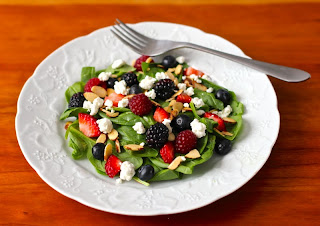In The News: Fruits, Especially Berries, Hot Topics Of Research This Month!
Studies focusing on fruit intake, namely berries,
have been plentiful in the news lately- linking fruit consumption to promoting
brain health and protecting against diabetes as well as heart attacks. This is
not surprising because there has been years of great data on fruits and veggies
and their positive effects on the body. Eating a variety of fruits (and
vegetables) daily supplies plenty of vitamins, minerals, fiber and
phytochemicals and it seems like everyday more exciting research comes to light
about their amazing powers!
Check out THIS RECENT REVIEW ARTICLE, that summarizes how
eating berry fruits is great for the brain and may help prevent age-related
memory loss and other changes. Berries are quite the superfood, also evidenced
by a STUDY released early this year noting that eating three or
more servings of blueberries and strawberries per week may help women reduce
their risk of a heart attack by as much as one-third!
Eating more fruit is also linked to a lowering ones
risk of Type 2 Diabetes, according to a NEW STUDY led by Harvard School of Public Health (HSPH) researchers. People who ate at least two
servings each week of whole fruits — namely blueberries, grapes, and apples —
reduced their risk for type 2 diabetes by as much as 23%! The key here is
eating whole fruits NOT juices because the researchers found quite the opposite
with higher juice intake.....those who consumed one or more servings of fruit
juice per day actually increased their risk of developing type 2 diabetes by as
much as 21%. In fact, replacing three servings of juice per week for
whole fruits would result in a 7% reduction in diabetes risk!
So grab a piece of fruit and enjoy! And try some of my fruity recipes like Quadruple Spinach Berry Salad, Raspberry Yogurt Pops, Winter Fruit Salad or Oat Pancakes!
Read more...













